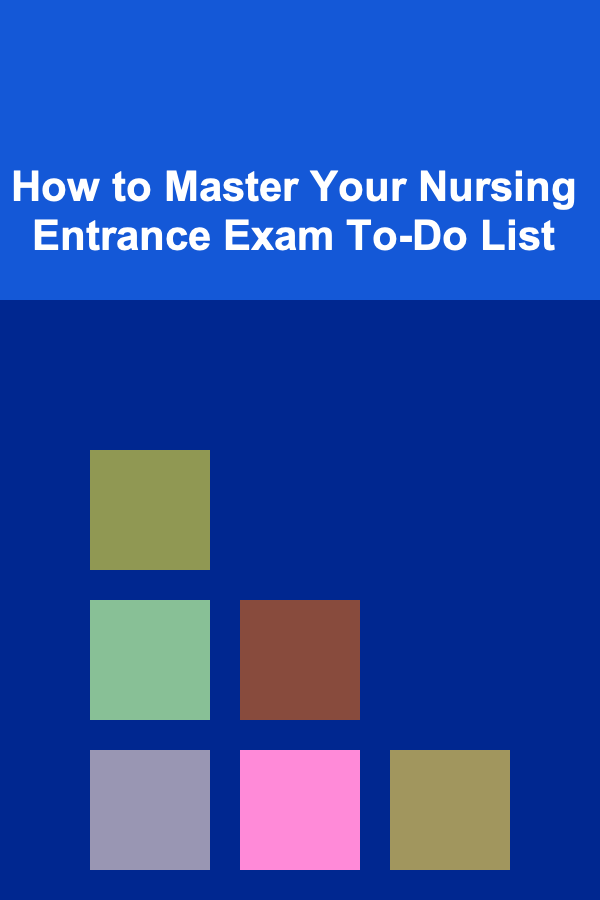
How to Master Your Nursing Entrance Exam To-Do List
ebook include PDF & Audio bundle (Micro Guide)
$12.99$11.99
Limited Time Offer! Order within the next:

The path to becoming a nurse is one filled with dedication, hard work, and perseverance. For many aspiring nurses, one of the most challenging steps to entering the profession is successfully navigating the nursing entrance exam. This crucial test can determine not only your admission into nursing school but also shape your future career. However, with the right approach, preparation, and mindset, mastering your nursing entrance exam is entirely achievable.
One of the best ways to ensure that you're fully prepared for the nursing entrance exam is by creating and managing an effective to-do list. A well-structured to-do list helps you organize your study schedule, track progress, and stay on top of your goals. In this article, we'll explore how to create a comprehensive nursing entrance exam to-do list and offer practical tips for mastering it.
Understand the Exam Format and Content
The first step in mastering your nursing entrance exam to-do list is understanding the structure and content of the exam itself. Nursing entrance exams often vary depending on the school or program you're applying to, but most tests assess similar core skills. The more you know about the specific exam format, the better you can prepare.
- Identify the Sections of the Exam: Most nursing entrance exams include sections on math, reading comprehension, biology, chemistry, and critical thinking. Understanding these sections will help you prioritize your study time and focus on the areas where you may need the most improvement.
- Learn the Exam Duration and Scoring: Familiarize yourself with the time allotted for each section and how the test is scored. This helps you manage your time effectively during the exam and know how to pace yourself when studying.
- Research Commonly Asked Questions: Find out what kinds of questions are commonly asked in each subject area. Many nursing programs provide sample questions or practice tests on their websites, which can give you a clearer idea of what to expect.
Tip: Review the syllabus or guidebook for your specific nursing entrance exam. If the exam is standardized (such as the TEAS or HESI), look for official study guides or practice exams that mirror the actual test.
Create a Detailed Study Plan
Once you understand the exam format, it's time to create a detailed study plan. A study plan is essentially your roadmap for success. A good study plan breaks down your preparation into manageable tasks and allows you to allocate enough time to each section of the exam.
- Assess Your Strengths and Weaknesses: Start by reviewing each subject area (math, science, reading, etc.) and assessing your level of proficiency. If you're already confident in a particular subject, you can spend less time on it. Focus your energy on the areas that are more challenging.
- Set Achievable Milestones: Break your study plan down into smaller, achievable goals. For example, aim to complete one chapter of biology or review a specific math formula each week. By setting realistic goals, you can avoid feeling overwhelmed and maintain steady progress.
- Plan Study Sessions: Block out time for each subject in your study schedule. Make sure you're consistent in your study habits---consider dedicating specific days to specific subjects to ensure you cover everything. Consider using techniques like the Pomodoro method (25 minutes of focused study followed by a 5-minute break) to maintain focus.
Tip: Use tools like Google Calendar or a physical planner to schedule your study sessions and track your progress. Stick to the schedule as closely as possible to avoid cramming last minute.
Prepare for the Math Section
The math section of the nursing entrance exam often includes questions on arithmetic, algebra, and sometimes statistics. For many students, math can be one of the most intimidating sections. However, with the right preparation, you can tackle this section confidently.
- Review Key Math Concepts: Start by reviewing fundamental math concepts such as addition, subtraction, multiplication, division, fractions, percentages, and basic algebra. You don't need to become an expert in advanced math, but you should be able to handle everyday math problems.
- Practice Word Problems: Many nursing entrance exams include word problems that require you to apply math concepts to real-world scenarios. Practice these types of questions by using study guides or online resources to improve your problem-solving skills.
- Use Practice Tests: Practice solving math problems under timed conditions to simulate the exam experience. This will help you build confidence and improve your speed in solving questions.
Tip: Use online platforms like Khan Academy or Mathway to reinforce your math skills through interactive lessons and problem-solving exercises.
Focus on Science: Biology and Chemistry
The science portion of nursing entrance exams typically covers biology and chemistry. This section tests your understanding of scientific concepts that are fundamental to nursing, including human anatomy, physiology, and biochemistry. It's important to approach your science studies strategically.
- Review Key Concepts in Biology: Focus on important biological topics like cell structure, genetics, human systems (e.g., circulatory, respiratory, digestive), and microbiology. Understanding the basic principles of biology will help you answer questions related to anatomy and physiology on the exam.
- Study Chemistry: Review the basics of chemistry, including atomic structure, chemical bonding, reactions, and the properties of different elements. Many nursing entrance exams feature questions about chemical processes in the body, so a solid grasp of chemistry is essential.
- Use Visual Aids: Diagrams, charts, and flashcards can help you better visualize complex scientific concepts. Consider creating your own set of flashcards or using apps like Quizlet to memorize key terms and processes.
Tip: Take advantage of free online resources such as YouTube videos, educational websites, and study guides to enhance your understanding of complex biology and chemistry topics.
Master Reading Comprehension
The reading comprehension section of the nursing entrance exam assesses your ability to read and understand complex written material, which is crucial for interpreting patient records and communicating effectively in clinical settings.
- Practice Active Reading: When studying reading comprehension, practice actively engaging with the material by highlighting important points, taking notes, and summarizing key ideas. This helps you retain information and improves your ability to answer questions based on the text.
- Develop Your Vocabulary: A strong vocabulary will not only help you understand complex texts but also improve your performance in other areas of the exam. Regularly review new words and phrases, and consider using flashcards or vocabulary apps to build your vocabulary.
- Practice Timed Reading: Work on your speed and comprehension by reading practice passages under timed conditions. This will help you learn how to efficiently read and answer questions without feeling rushed.
Tip: To strengthen your reading comprehension skills, read a variety of texts, including medical journals, newspapers, and novels. The more you read, the better you will become at quickly identifying key points in written material.
Improve Your Critical Thinking Skills
Critical thinking is a key skill for nursing professionals. Nursing entrance exams often feature questions that assess your ability to reason, analyze information, and make decisions. Strengthening your critical thinking skills will help you perform well in this section and will also benefit your future nursing practice.
- Practice Problem-Solving: Work on solving case studies or hypothetical scenarios that require critical thinking. For example, how would you prioritize patient care in an emergency situation? These exercises will help you develop the analytical skills needed for the exam.
- Focus on Clinical Scenarios: Many nursing entrance exams include clinical or real-life scenarios. Practice answering questions related to patient care, nursing ethics, and decision-making to strengthen your critical thinking abilities.
- Reflect on Your Thought Process: After completing a practice test, reflect on the questions you found challenging. Consider what led you to your answers and how you can improve your thought process for next time.
Tip: Online nursing practice exams often include critical thinking questions that simulate real-world clinical situations. Use these resources to test your decision-making skills under pressure.
Take Care of Your Physical and Mental Health
Preparing for a nursing entrance exam can be stressful, and it's easy to get overwhelmed by the amount of material you need to cover. It's essential to prioritize self-care during this time to ensure that you're performing at your best.
- Get Enough Sleep: Sleep is crucial for memory consolidation and focus. Aim for 7-9 hours of sleep each night to ensure you're well-rested and alert during your study sessions and on exam day.
- Exercise Regularly: Physical activity boosts your energy levels, improves mood, and reduces stress. Consider incorporating exercise into your routine, even if it's just a short walk or stretching exercises.
- Manage Stress: Practice stress-reducing techniques such as deep breathing, mindfulness meditation, or journaling. Taking breaks during study sessions to relax and recharge can help you stay focused and prevent burnout.
Tip: Avoid over-studying or cramming the night before the exam. A rested, well-prepared mind will perform much better than a fatigued one.
Review and Adjust Your To-Do List
As you progress in your preparation, it's important to regularly review your to-do list and make adjustments as necessary. This ensures that you stay on track and focus on areas that need the most attention.
- Evaluate Your Progress: At the end of each week, assess your progress and make sure you're staying on schedule with your study goals. If you're falling behind in certain areas, allocate extra time to those subjects in the coming weeks.
- Revise Your Goals: If you're finding certain sections easier than expected, consider adjusting your to-do list to spend more time on challenging subjects. Flexibility is key to staying on top of your exam preparation.
- Stay Motivated: Break down your to-do list into smaller, more manageable tasks to avoid feeling overwhelmed. Celebrate small victories along the way, like completing a study session or mastering a difficult concept.
Tip: Use an app or a physical planner to keep your to-do list organized and easily accessible. Regularly updating it will help you stay motivated and maintain a sense of accomplishment.
Take Practice Exams
As your exam day approaches, taking practice exams will help you assess your readiness and identify any remaining gaps in your knowledge. Practice exams simulate the test environment and give you a sense of what to expect on the real exam.
- Simulate Exam Conditions: Take practice exams in a quiet, distraction-free environment, and stick to the time limits set by the exam. This will help you build stamina and improve your time management skills.
- Review Your Mistakes: After completing a practice exam, thoroughly review the questions you got wrong. Understand why you made those mistakes and adjust your study plan to focus on those areas.
- Repeat Practice Exams: Taking multiple practice exams will help you improve your performance and boost your confidence. Track your progress to see how your scores improve over time.
Tip: Use reputable nursing exam prep books or online resources that offer practice exams with detailed explanations for each answer.
Stay Positive and Confident
Finally, confidence plays a significant role in exam performance. Believing in your ability to succeed and staying positive will help you approach the exam with a clear, focused mind.
- Visualize Success: Visualizing yourself passing the exam can boost your confidence and motivation. Spend a few minutes each day imagining yourself acing the exam and moving one step closer to becoming a nurse.
- Avoid Negative Thinking: Don't dwell on past mistakes or worry about potential challenges. Stay focused on your current progress and trust that your hard work will pay off.
- Support System: Surround yourself with supportive friends, family, and peers who encourage you throughout your preparation process. Having a strong support system can provide much-needed motivation during difficult times.
Tip: Remind yourself that preparation is key. Trust the effort you've put into your studies, and approach the exam with confidence and a calm mind.
Conclusion
Mastering your nursing entrance exam to-do list requires careful planning, consistent effort, and a strong mindset. By following the strategies outlined in this article---such as understanding the exam format, creating a detailed study plan, focusing on key subjects like math and science, and practicing critical thinking---you'll be well on your way to success. With dedication, self-care, and a positive attitude, you can confidently tackle your nursing entrance exam and move closer to achieving your goal of becoming a nurse.
Reading More From Our Other Websites
- [Star Gazing Tip 101] Best Low‑Cost Spectroscopy Kits for Analyzing Starlight at Home
- [Home Holiday Decoration 101] How to Incorporate Natural Elements in Your Holiday Decorations
- [Home Cleaning 101] How to Maintain a Dust-Free Home: Tips and Tricks
- [Home Party Planning 101] How to Organize a Themed Potluck Party at Home
- [Home Pet Care 101] How to Prevent and Treat Common Pet Allergies at Home
- [Home Storage Solution 101] How to Organize and Store Your Kitchen Appliances Efficiently
- [Scrapbooking Tip 101] Turning Old Vinyl Records into Unique Scrapbook Backgrounds
- [Toy Making Tip 101] Sewing Magic: Crafting Custom Stuffed Animals with Minimal Tools
- [Toy Making Tip 101] Creative Upcycling: 5 Simple Toy Projects Using Materials You'll Find at Home
- [Polymer Clay Modeling Tip 101] How to Sculpt Polymer Clay Marine Creatures for Aquarium‑Themed Decor

How to Create a Home Decor Wishlist on a Budget
Read More
How to Decorate Your Apartment Without a Huge Budget
Read More
How To Taste Organic and Biodynamic Wines
Read More
How To Improve Your Communication as a Shot Caller
Read More
How to Calibrate Your Resin 3D Printer
Read More
Selecting the Best Oven Thermometer for Accurate Baking Temperatures
Read MoreOther Products

How to Create a Home Decor Wishlist on a Budget
Read More
How to Decorate Your Apartment Without a Huge Budget
Read More
How To Taste Organic and Biodynamic Wines
Read More
How To Improve Your Communication as a Shot Caller
Read More
How to Calibrate Your Resin 3D Printer
Read More